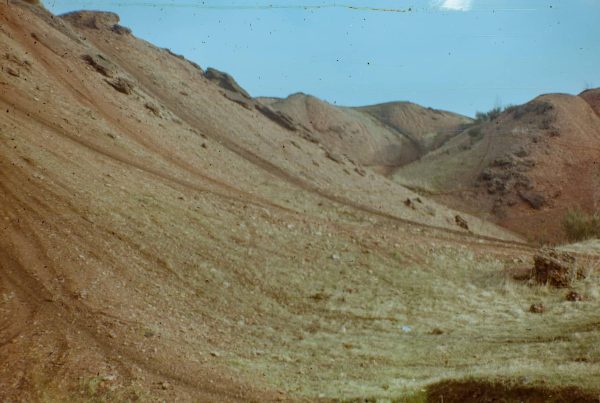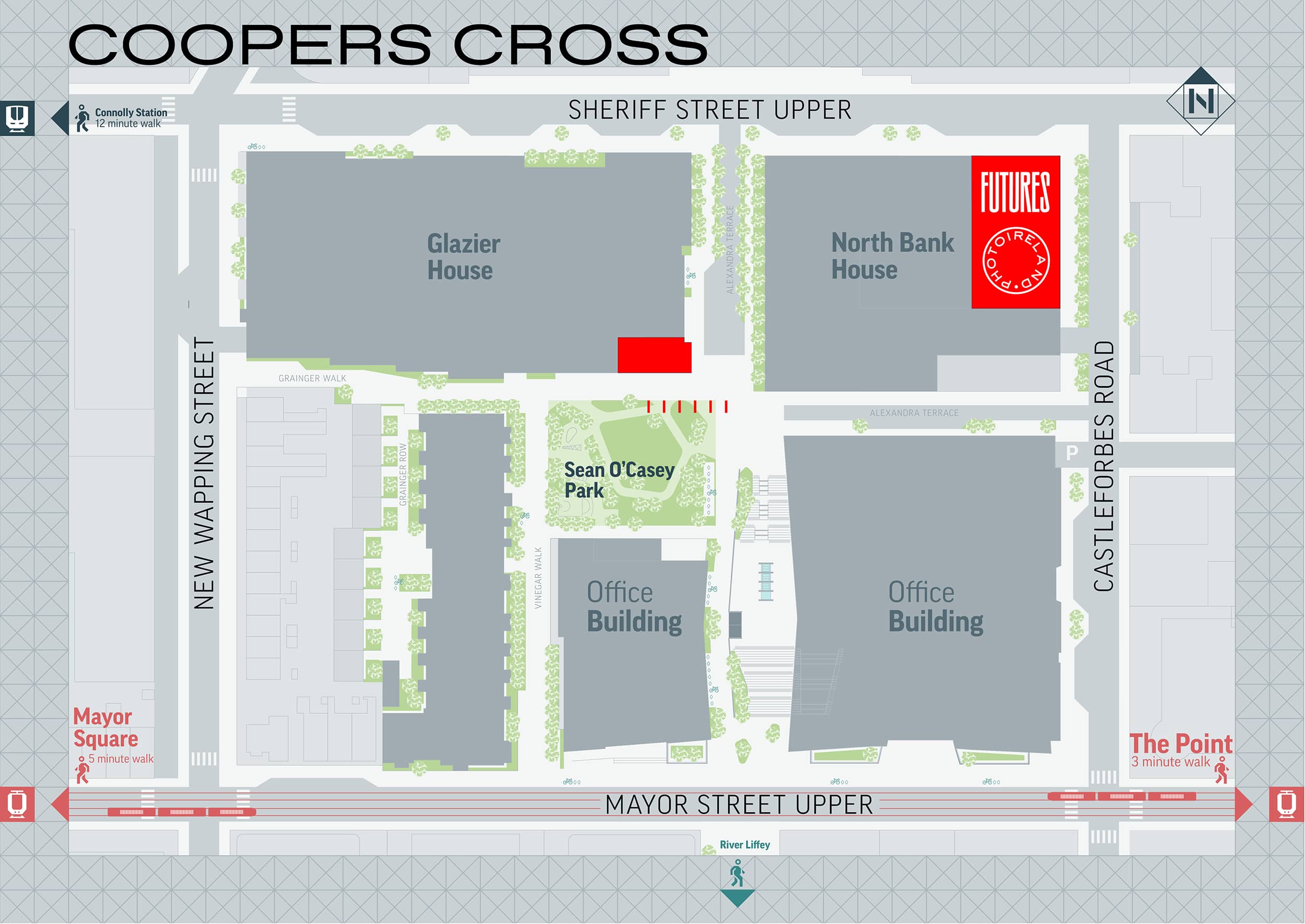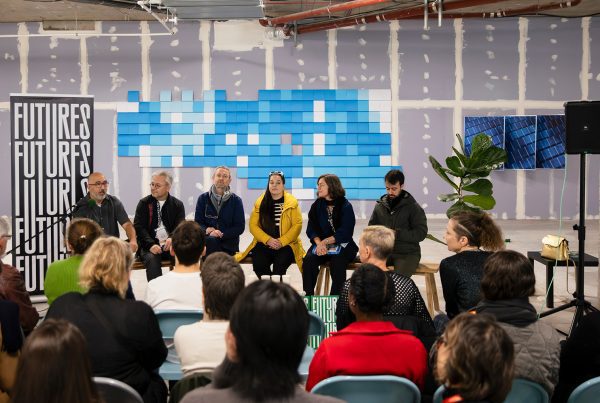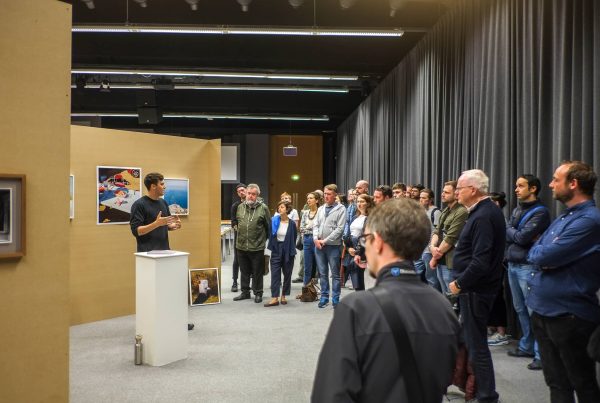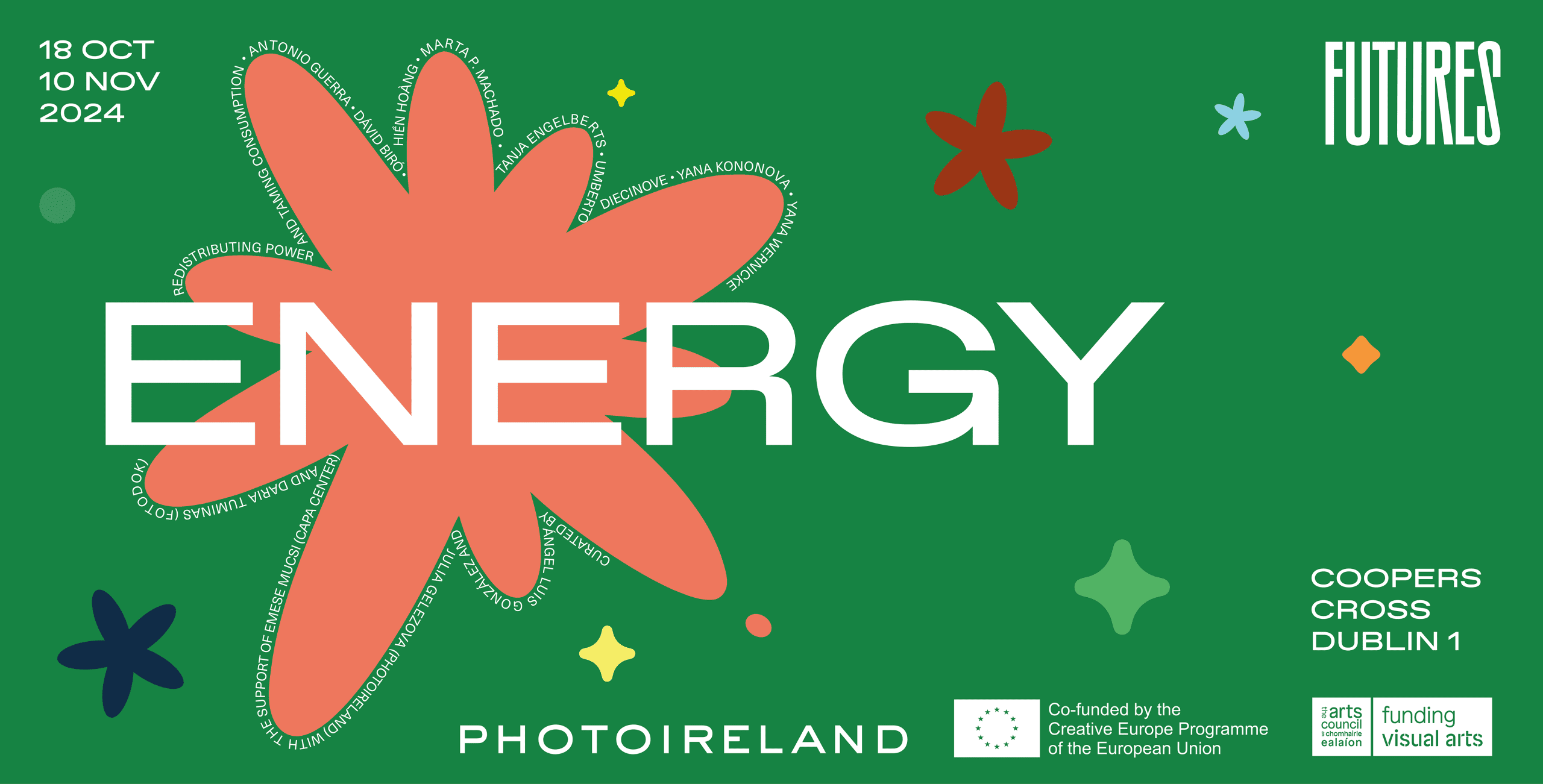
ENERGY: Redistributing Power and Taming Consumption
Exhibition run 18 October–10 November 2024
Opening Hours 11am-6pm Tue-Sun. Closed Mondays.
At North Bank House, Coopers Cross, 49 Castleforbes Road, North Wall, Dublin 1.
This October, PhotoIreland presents in Dublin a series of exhibitions and events that celebrate contemporary photographic practices and converse around current socio-political concerns. Kindly supported by the Arts Council of Ireland and co-funded by Creative Europe, the programme is part of this year’s activities from the FUTURES Photography Platform to amplify artists across Europe.
The programme is divided in two sections:
- The group show ENERGY: Redistributing Power and Taming Consumption presenting works never before shown in Ireland by artists Antonio Guerra (ES), Dávid Biró (HU), Hiền Hoàng (VE/DE), Marta Pinto Machado (CV/PT), Tanja Engelberts (NL), Umberto Diecinove (IT), Yana Kononova (UA), Yana Wernicke (DE). The exhibition is curated by Ángel Luis González and Julia Gelezova (PhotoIreland), with the support of Emese Mucsi (Capa Center) and Daria Tuminas (FOTODOK).
- The FUTURES MEET UP mediating the exhibition with free artist tours and talks while providing private professional opportunities to local and international artists through group critiques, networking events and studio visits.
You can find on this page all the details relating the programme that is being hosted at the Coopers Cross quarter starting at the North Bank House, 49 Castleforbes Road, North Wall, Dublin 1, and continuing at the Glazier House and Sean O’Casey Park.
FUTURES Photography Platform is co-funded by the Creative Europe programme of the European Union and PhotoIreland’s participation is kindly supported by the Arts Council of Ireland through the Co-Funding Award.
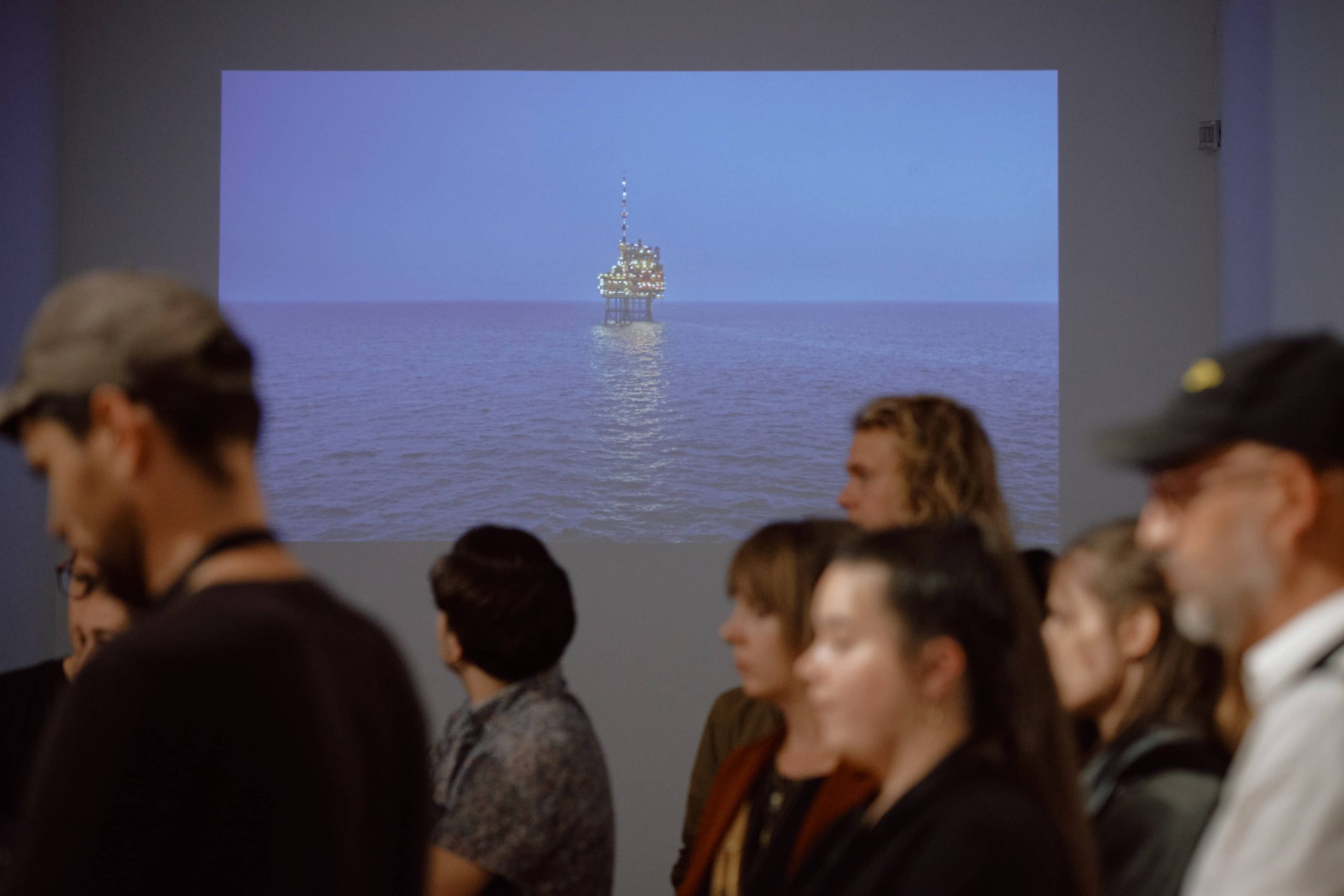
Launch 6pm Thu 17 October 2024
Exhibition Run 18 October–10 November 2024
Opening Hours 11am-6pm Tue-Sun. Closed Mondays and 18-19th October for events
At North Bank House, Coopers Cross, 49 Castleforbes Road, North Wall, Dublin 1.
ENERGY: Redistributing Power and Taming Consumption is a group exhibition, an anthology of diverse photographic projects focusing on energy, one of the most relevant and complex topics today, and one which everybody has to deal with either as a private or as a public matter. The show comprises work by eight international artists from the FUTURES Photography Platform, of which PhotoIreland is the Irish representative.
The exhibition runs across the Coopers Cross quarter in the North Docks, Dublin 1, divided across the North Bank House (the starting point of the exhibition), Glazier House and Sean O’Casey Park.
From personal stories to documentary and social approaches, to the exploration of the limits of photography as a medium seeking new forms of narration, each photo series and multi-media installations lined up in the ENERGY: Redistributing Power and Taming Consumption exhibition could stand on its own as a case study, providing a condensed representation of the ideas associated with this multilayered topic. While some projects talk about the destructive forces of energy in warfare or in extractivist society (Tanja Engelberts; Yana Kononova), others explore existing strategies as possible solutions (Dávid Biró; Umberto Diecinove; Antonio Guerra), exemplify desirable companionships (Yana Wernicke) and reflect on healing (Hien Hoang). Finally, there is a perspective on how the colonial and capitalist structures shaped contemporary cities and how the energy of presence in these spaces could be a form of resistance (Marta Pinto Machado).
Each year, a number of FUTURES members co-curate an international travelling exhibition. The exhibition is launched at the members’ respective countries accompanied by the Meet Up event that acts as a get together point for invited international and local professionals and local artists. This year’s exhibition ENERGY: Redistributing Power and Taming Consumption is co-curated by members FOTODOK, PhotoIreland, and the Robert Capa Contemporary Photography Center, with Fotomuseum Antwerpen as publishing partner of Trigger. The Dublin exhibition is curated by Ángel Luis González and Julia Gelezova (PhotoIreland), with the support of Emese Mucsi (Capa Center) and Daria Tuminas (FOTODOK).
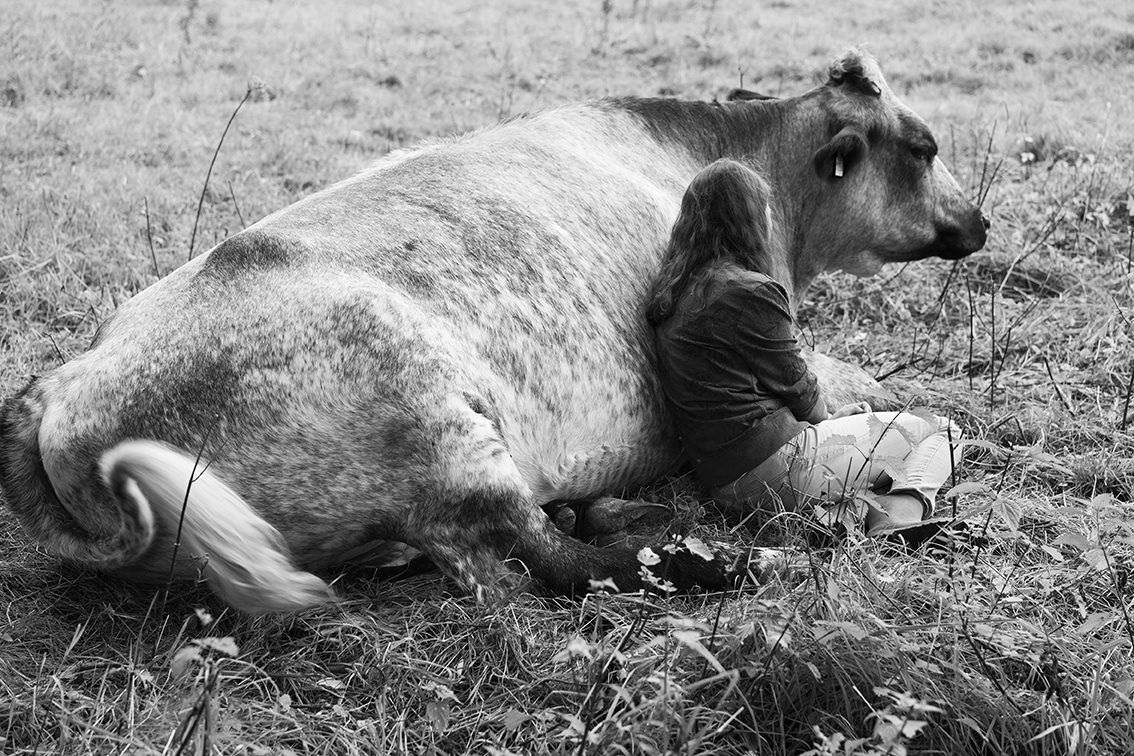
Meet Up Events 17-19 October 2024.
At North Bank House, Coopers Cross, 49 Castleforbes Road, North Wall, Dublin 1.
The FUTURES Meet Up event acts as a get-together point for invited international and local professionals and local artists. As part of the FUTURES Meet Up in Dublin, PhotoIreland is programming a three-day programme of private and public events, including the Critical Practice Reviews, talks, and a tour. During the Meet-up, attendees will discover the work and practice of FUTURES talents and meet with other international and local professionals and artists. It is the ideal chance to exchange ideas and network.
To the Meet Up in Dublin, we welcome international exhibition artists Antonio Guerra, Dávid Biró, Hiền Hoàng, Marta Pinto Machado, Tanja Engelberts, Umberto Diecinove, Yana Kononova, and Yana Wernicke and professionals Anna O’Sullivan, Chris Clarke, Emese Musci, Henri Badaröh, Mariama Attah, Nadine Isabelle Henrich, Pádraic E. Moore, Sara Muthi, Sarah McAuliffe, and Tiago Casanova.
FUTURES MEET UP 2024
PROGRAMME
The FUTURES MEET UP programme offers a combination of public and private events. In the programme below, these are diiferentiated by colour, public being green and private being red.
THURSDAY 17TH OCTOBER
6-8pm Launch of Exhibition ENERGY: Redistributing Power and Taming Consumption
Location: North Bank House
6:30pm Opening speech by Ángel Luis González, Director of PhotoIreland, and Aoife Tunney, Joint Head of Creative Europe Culture Office of the Arts Council of Ireland
7-8pm Artists Meet and Greet with Antonio Guerra, Dávid Biró, Hiền Hoàng, Marta Pinto Machado, Tanja Engelberts, Umberto Diecinove, Yana Kononova, and Yana Wernicke. All visitors are invited to disciver the artworks and get to talk with the artists.
The exhibition venues close strictly at 8pm.
FRIDAY 18TH OCTOBER
The exhibition venues are closed on Friday 18th October to host the private programme and Critical Practice Reviews.
10.30am-2:30pm Critical Practice Reviews
Location: North Bank House.
Irish Artists participating in the Critical Practice Reviews are Aisling McCoy, Aoife Herrity, Berta Mars, Caitriona Dunnett, Conn McCarrick, Daragh Soden, David Thomas Smith, Dee Byrne, Emma O’Brien, Garry Loughlin, Iollann Ó Murchú, Jane Cummins, Kate Nolan, Leon Neville Gallagher, Mary Furlong, Nazli Yildirim, Ryan Allen, Samuel Luke Booth, Spencer Glover, and Yvette Monahan.
The local and international professionals participating are Anna O’Sullivan, Director and Chief Curator, Butler Gallery; Chris Clarke, Senior Curator, The Glucksman; Emese Musci, Curator, Robert Capa Contemporary Photography Center; Henri Badaröh, Editor, FOAM Magazine; Mariama Attah, Curator of Photography, National Portrait Gallery and Associate Curator, Deutsche Börse; Nadine Isabelle Henrich, Curator of the House of Photography, Deichtorhallen Hamburg; Pádraic E. Moore, Artistic Director, Ormston House; Sara Muthi, Independent Curator and Curatorial Fellow, Irish Museum of Modern Art; Sarah McAuliffe, Curator, Royal Hibernian Academy of Arts; Tiago Casanova, Artist and Editor, XYZ Books.
3-5pm Private Exhibition Visits for international artists and curators.
Location: Dublin Port.
Guided visit to TBG+S at Dublin Port: Longest Way Round, Shortest Way Home, kindly hosted by curator Michael Hill.
SATURDAY 19TH OCTOBER
Please note, the exhibition venues will be closed outside of the public events listed below to accommodate the FUTURES MEET UP programme.
10-11:30am Exhibition Tour: ENERGY: Redistributing Power and Taming Consumption
Free but booking is mandatory. Book here →
Location: North Bank House.
Join PhotoIreland staff and exhibition artists Antonio Guerra, Dávid Biró, Hiền Hoàng, Marta Pinto Machado, Tanja Engelberts, Umberto Diecinove, Yana Kononova, and Yana Wernicke. The tour starts strictly at 10am at the North Bank House, proceeding to Glazier House, and concluding at the Sean O’Casey Park.
12-1pm Panel Talk: Fuelling Culture: Arts Practice and the sum of its parts.
Free and booking is mandatory. Book here →
Location: North Bank House.
The panel talk welcomes five professionals from a range of cultural sectors across Europe, to share their experience and gathered knowledge on encouraging cooperation and cultural exchange between arts organisations and artists across Europe and beyond. We welcome Menno Liauw, Founder and Director of the European photography platform FUTURES and Artistic Director of EXPOSED Photography Festival in Turin; University of Westminster Reader in Photography Lucy Soutter introducing the recently released volume The Routledge Companion to Global Photographies; Emese Musci, Curator, Robert Capa Contemporary Photography Center, contributor to The Routledge Companion to Global Photographies and member of the Global Photographies Network; Tiago Casanova, artist and editor at XYZ Books, who will share the motivation behind the new transnational project Intergalactica: books for the culture without borders and the role publishing plays in global connectivity; and Gavin Murphy, artist and co-founder of Artist Run Europe project, exemplifying how artist-run spaces are a distinctive and central part of visual art culture, and how they present a necessary set of alternatives to the art institution.. The panel will be chaired by Ángel Luis González, Director of PhotoIreland.
FUTURES: FUTURES is a Europe-based photography platform bringing together the global photography community to support and nurture the professional development of emerging artists across the world. The aim is to add long term value in empowering early and mid-career photographers – launching initiatives to promote their work and granting them access to an unprecedented network of professionals, markets and audiences.
The Routledge Companion to Global Photographies: In response to widespread demand for more knowledge and insight about contemporary photographies beyond Western centres of production and dissemination, this volume provides a transnational discussion, grounded in dialogue between authors and editors from diverse locations and contexts.
Intergalactica: Intergalactica: books for the culture without borders, is a transnational project which connects institutions and artists, across four different countries: Portugal, Spain, The Netherlands, and Italy. Intergalactica aims to strengthen the cultural tradition of artbooks, create participatory space through the use of workshops, open talks and exhibitions.
Artist Run Europe: Artist-Run Europe is part how-to manual, part history, and part socio-political critique of the conditions, organisational models, and role of artist-led practice within contemporary art and society. An ongoing research and publishing project with multiple contributors and iterations, it includes case studies of spaces and projects, essay texts, and a detailed index of artist-run spaces from across Europe.
2-5pm Private Studio Visits for guest artists and curators
Location: Across Dublin city
A programme of private studio visits organised in collaboration with TBG+S, Fire Station Artists’ Studios, The Library Project, and Pallas Projects/Studios,
6-7pm Photobook Launch: All things laid dormant by Benedetta Casagrande
Location: The Library Project
Join us at The Library Project to celebrate the launch of All things laid dormant by Benedetta Casagrande and get to meet the artist. Read all the details here. The Library Project venue closes to the public strictly at 7pm.
7pm FUTURES MEET UP Closing Event
Location: The Library Project
Private event for all local and international guests to mark the end of the FUTURES MEET UP in Dublin. Food, music, raffle, and plenty of banter.
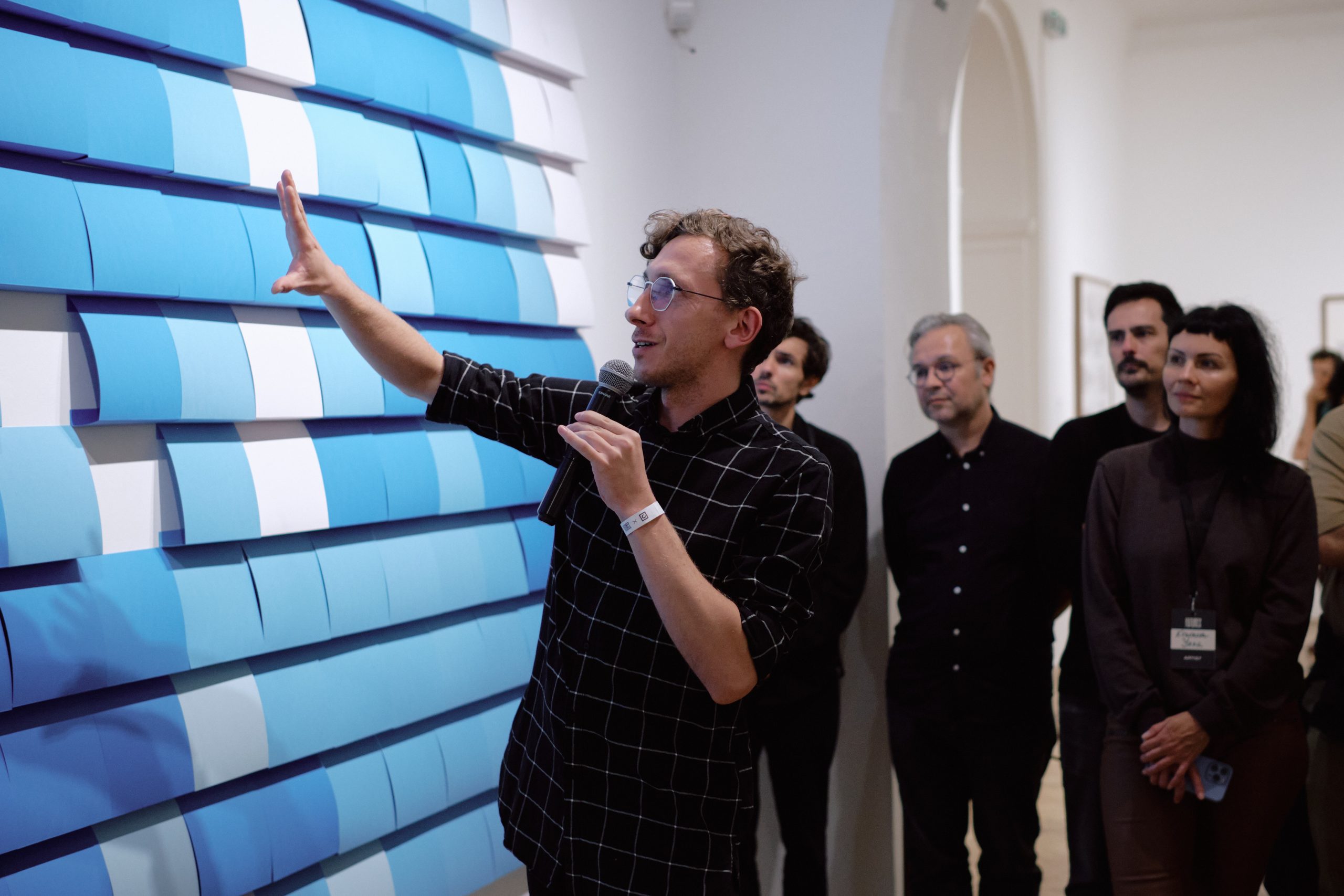
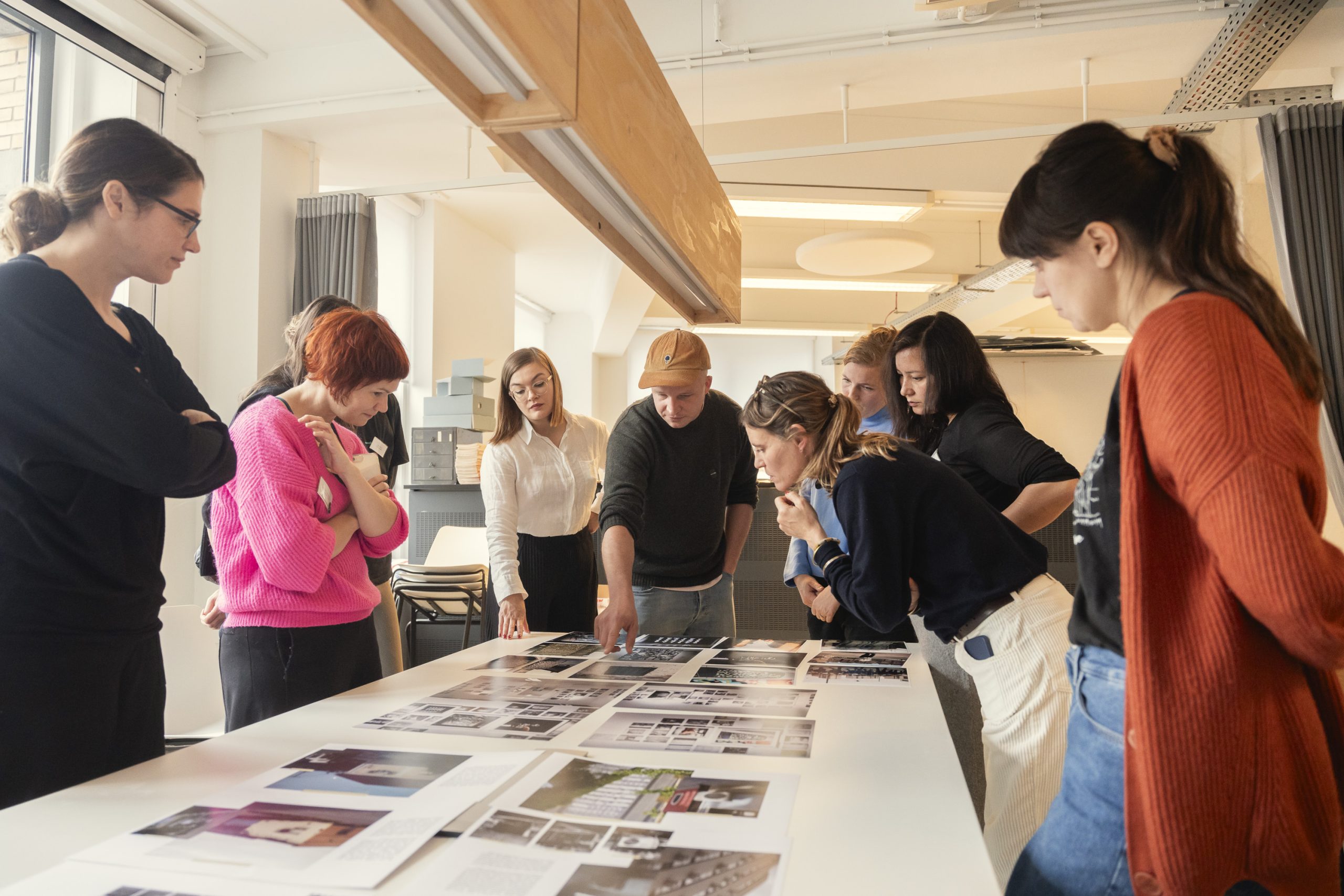

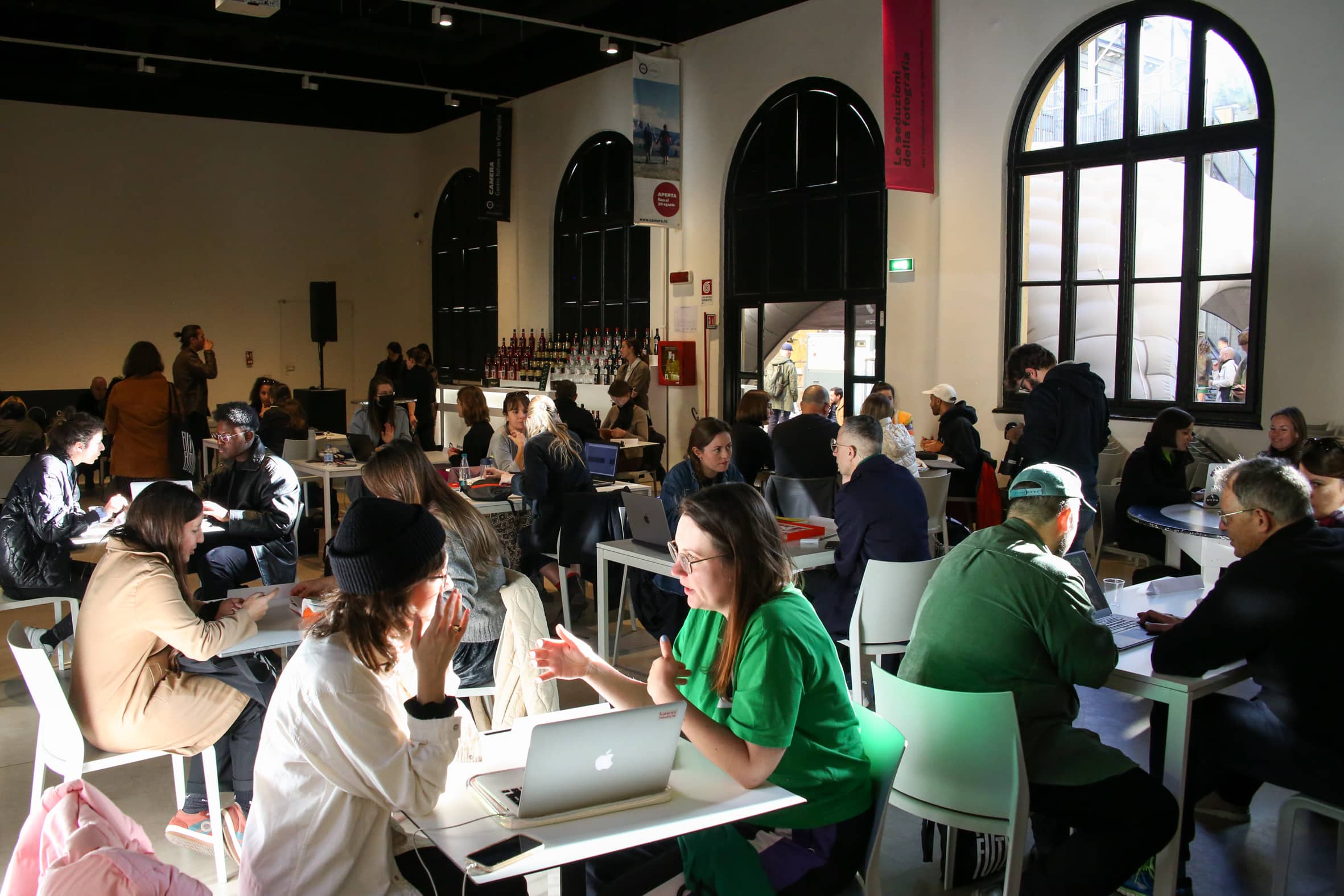
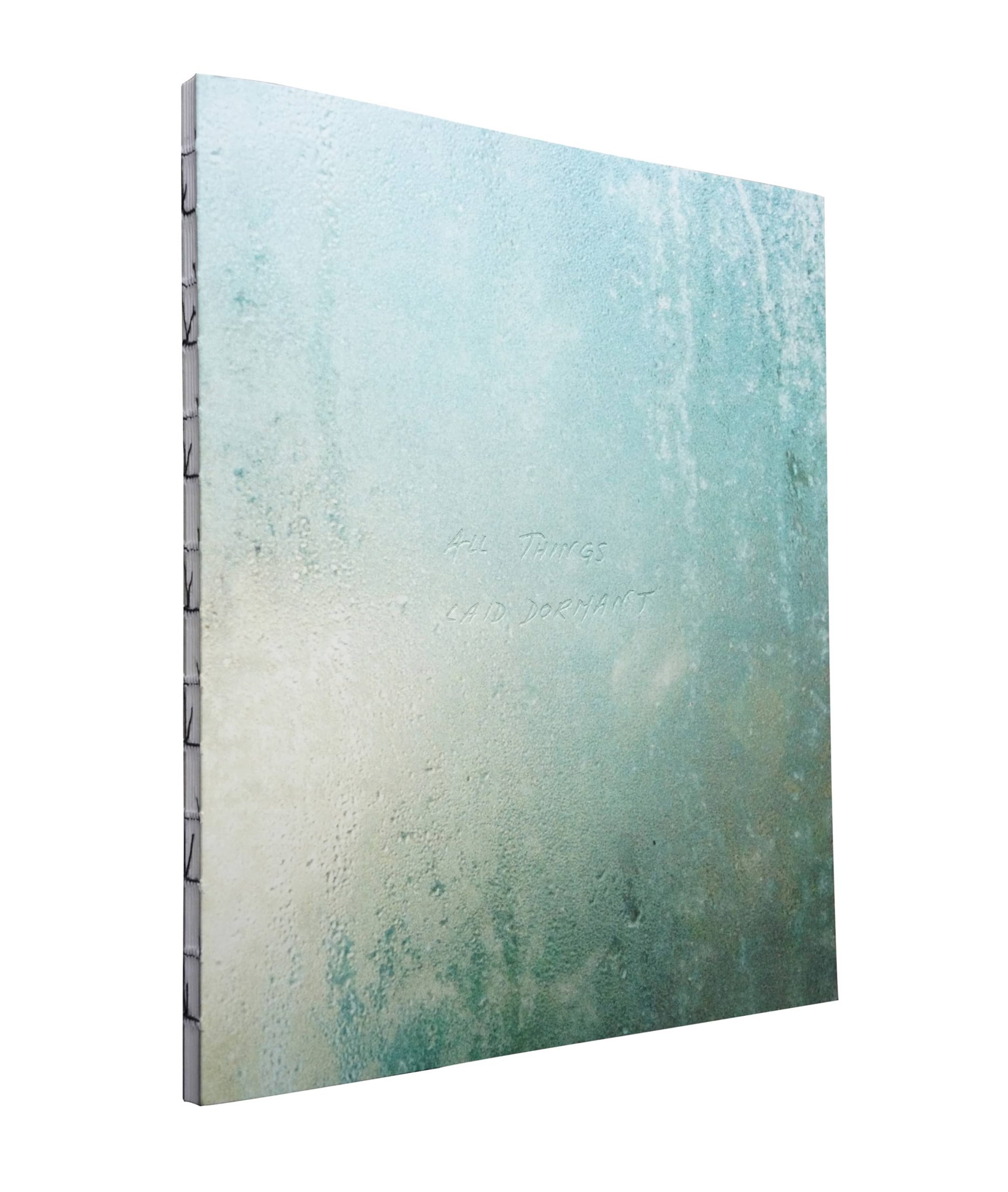
Critical Practice Reviews 18th October 2024
Private event Participation is exclusively by invitation
At North Bank House, 49 Castleforbes Rd, North Wall, Dublin 1.
What are the Critical Practice Reviews?
Critical Practice Reviews at the MEET UP
To contribute to the Critical Practice Reviews and the FUTURES Meet Up programme, we have invited a number of local and international professionals that participating artists will have the opportunity to meet. They are:
- Anna O’Sullivan, Director and Chief Curator, Butler Gallery
- Chris Clarke, Senior Curator, The Glucksman
- Emese Musci, Curator, Robert Capa Contemporary Photography Center
- Henri Badaröh, Editor, FOAM Magazine
- Mariama Attah, Curator of Photography, National Portrait Gallery and Associate Curator, Deutsche Börse
- Nadine Isabelle Henrich, Curator of the House of Photography, Deichtorhallen Hamburg
- Pádraic E. Moore, Artistic Director, Ormston House
- Sara Muthi, Independent Curator and Curatorial Fellow, Irish Museum of Modern Art
- Sarah McAuliffe, Curator, Royal Hibernian Academy of Arts
- Tiago Casanova, Artist and Editor, XYZ Books
While the guests are in Dublin to participate in the FUTURES Meet Up programme, any third party organisation interested in meeting with these art professionals should direct their request to Julia Gelezova at [email protected]
Access Bursaries
- A Caretaker
- Parental support (co-parent assistance, childminder, etc)
- Transport
- Overnight stays
- Technical support
While we strive to continuously improve all our support projects for artists, we may fail to address specific needs that are not brought to our attention. If you are experiencing any barriers with any application process to any opportunity presented by PhotoIreland, please let us help you: get in touch and let’s talk.
If you need any details about the Critical Practice Reviews, get in touch at [email protected]

Location:
North Bank House, 49 Castleforbes Rd, North Wall, Dublin 1.
Both the FUTURES MEET UP and the ENERGY exhibition are located in a new quarter of the North Docks neighbourhood named Coopers Cross. The headquarter is on the ground floor retail unit the North Bank House. The MEET UP events will take place here throughout the 18th and 19th of October, and it is also the starting point of the ENERGY exhibition that runs from the 17th of October to the 10th of November. In addition to this unit, the exhibition continues across the Coopers Cross quarter, in the Glazier House retail unit and the Sean O’Casey Park.
OPENING HOURS
Ope Daily 11am-6pm Tue-Sun.
Closed Mondays and 18-19th October for private events
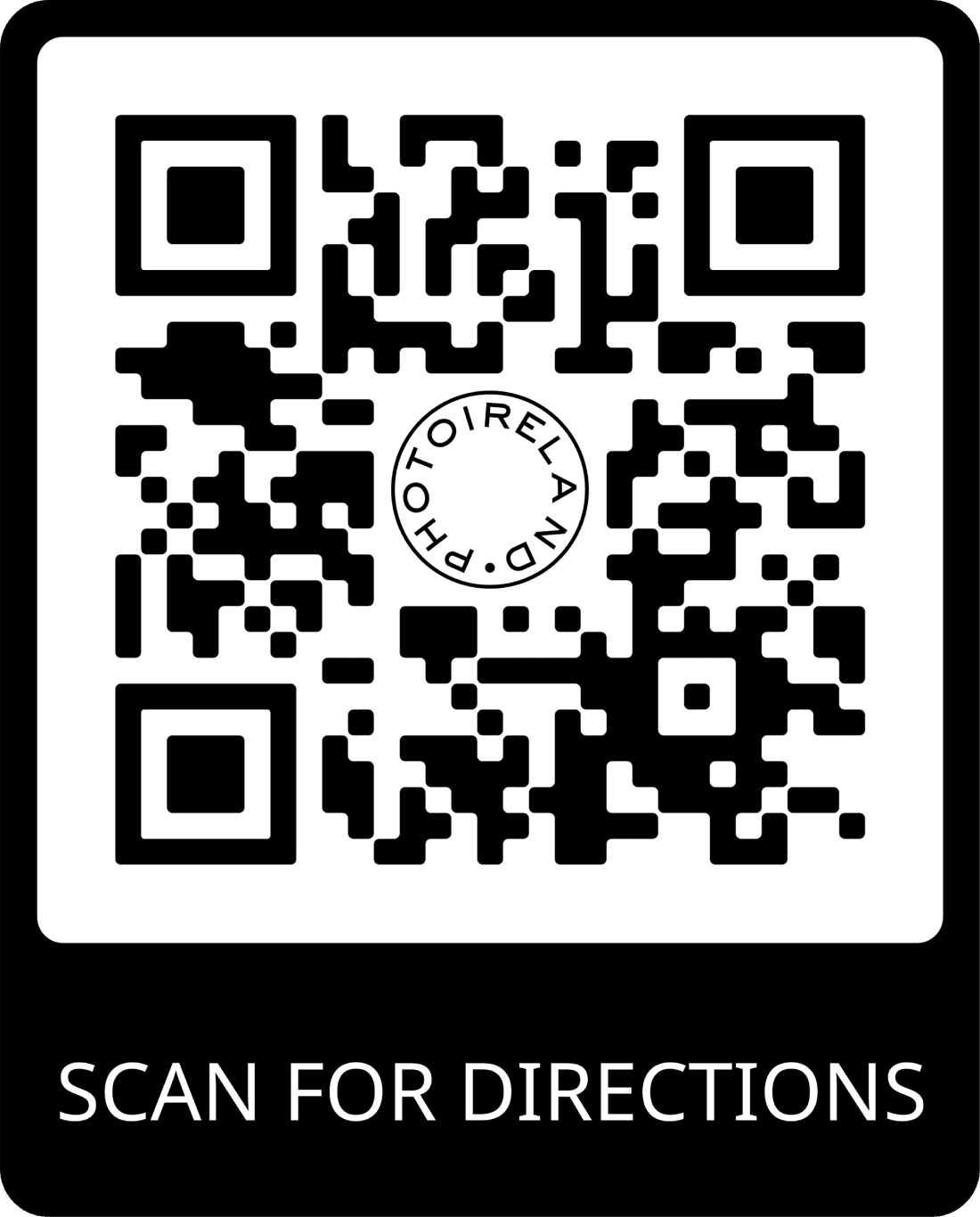 HOW TO GET THERE
HOW TO GET THERE
The easiest way to plan your transport to the FUTURES MEET UP and ENERGY exhibition is to check on your digital device directions from where you are to 49 Castleforbes Roadd, North Wall, Dublin 1 which is the location of the ground floor North Bank House retail unit entry door.
By LUAS, the best stop is The Point. The groundfloor North Bank House retail unit is a mere 3 minutes walk from there.
By car or taxi, just set your destination to 49 Castleforbes Road, North Wall, Dublin 1. Private car users should know that there are some paid park spaces available in Castleforbes Road, Sheriff Street, and around the area, but it is not greatly served and traffic can get busy at peak times.
If you are having trouble finding the North Bank House or need help, call 087 6856169 or email [email protected]
Location and access map for the North Bank House retail unit at 49 Castleforbes Rd, North Wall, Dublin 1.
About the FUTURES Photography Platform
Co-funded by the Creative Europe Programme of the European Union, FUTURES Photography Platform is a platform focused on amplifying emerging talents in photography in Europe. Since 2017, the aim of FUTURES Photography Platform is to pool the resources and talent programmes of leading photography institutions across Europe in order to increase the capacity, mobility and visibility of its selected artists. The FUTURES Photography Platform has grown since 2018 a collaborative network of 20 prominent institutions operating in the field of photography around Europe. These are: CAMERA – Centro Italiano per la Fotografia (IT), Centre Photographique Rouen Normandie (FR), Copenhagen Photo Festival (DK), Triennial of Photography Hamburg (DE), Der Greif (DE), FOMU (BE), FOTODOK (NL), Fotofestiwal Lodz (PL), Fotogalleriet (NO), Fotograf Magazine (CZ), Organ Vida (HR), ISSP (LV), PhotoIreland (IE), Photo Romania Festival (RO), Bienal Fotografia do Porto (PT), Robert Capa Contemporary Photography Center (HU), Void (GR), Photoforum Pasquart (CH), Photo Elysée (CH), and Centre de la photographie Genève (CH) and our research member, Eurokleis s.r.l. (IT)
In addition to the many local events and opportunities organised by the FUTURES members, an annual event brings together all artists and arts professionals from the platform. The format and events programmed change every year and in the past have included our presence at Unseen Amsterdam, involving a showcase of all the Futures artists, a special exhibition of a smaller selection of Futures artists, portfolio reviews, special Futures magazine publication, in addition to events like artists and members talks, networking opportunities etc. Beyond this work, the platform artists are promoted online, in publications, and have a profile page on the FUTURES website, where their work is featured: futures-photography.com/artists
Ireland in Europe and beyond
Since its inception, PhotoIreland has been the Irish member of the platform. Being invited as funding member was a clear sign of recognition of our work and ambition, and it has given us the opportunity to work in cooperation with many respected organisations, accessing and supporting exciting contemporary practices by artists and curators, while allowing us to promote Irish artists in the European arena.
To date, PhotoIreland has put forward 35 artists for the platform. They are: Aindreas Scholz, Aisling McCoy, Aoife Herrity, Audrey Gillespie, Barry W Hughes, Becks Butler, Berta Mars, Chris Finnegan, Cian Burke, Ciaran Óg Arnold, Clare Lyons, Debbie Castro, Dorje de Burgh, Emilia Rigaud, Emma O’Brien, Garry Loughlin, George Voronov, Jamin Keogh, Jialin Long, Leon Nevill Gallagher, Mark Duffy, Mark McGuinness, Megan Doherty, Miriam O’ Connor, Niamh Barry, Patrick O’Byrne, Pauline Rowan, Phelim Hoey, Róisín White, Ronan McCall, Ryan Allen, Sarah Navan, Shia Conlon, Vera Ryklova, and Yvette Monahan. PhotoIreland works with the platform members every year to support their practice and open new opportunities.
About PhotoIreland
PhotoIreland provides a unique support framework focused on artists, the artform and audiences.
PhotoIreland grows the reputation of Irish artists globally through a 360 degree support system and platform for contemporary photography, activated through a diversity of projects. These include events such as PhotoIreland Festival and Halftone print fair amongst others; resources such as the PhotoIreland Collection, a specialised research library of photobooks, and Ireland’s Art Bookshop, The Library Project; via publishing with projects such as OVER Journal and TLP Editions; professional development support through networking and consultancy opportunities; and empowering early and mid-career photographers via our international partnerships, most relevantly through Creative Europe co-funded platforms such as FUTURES.
Learn more about our work at photoireland.org/about
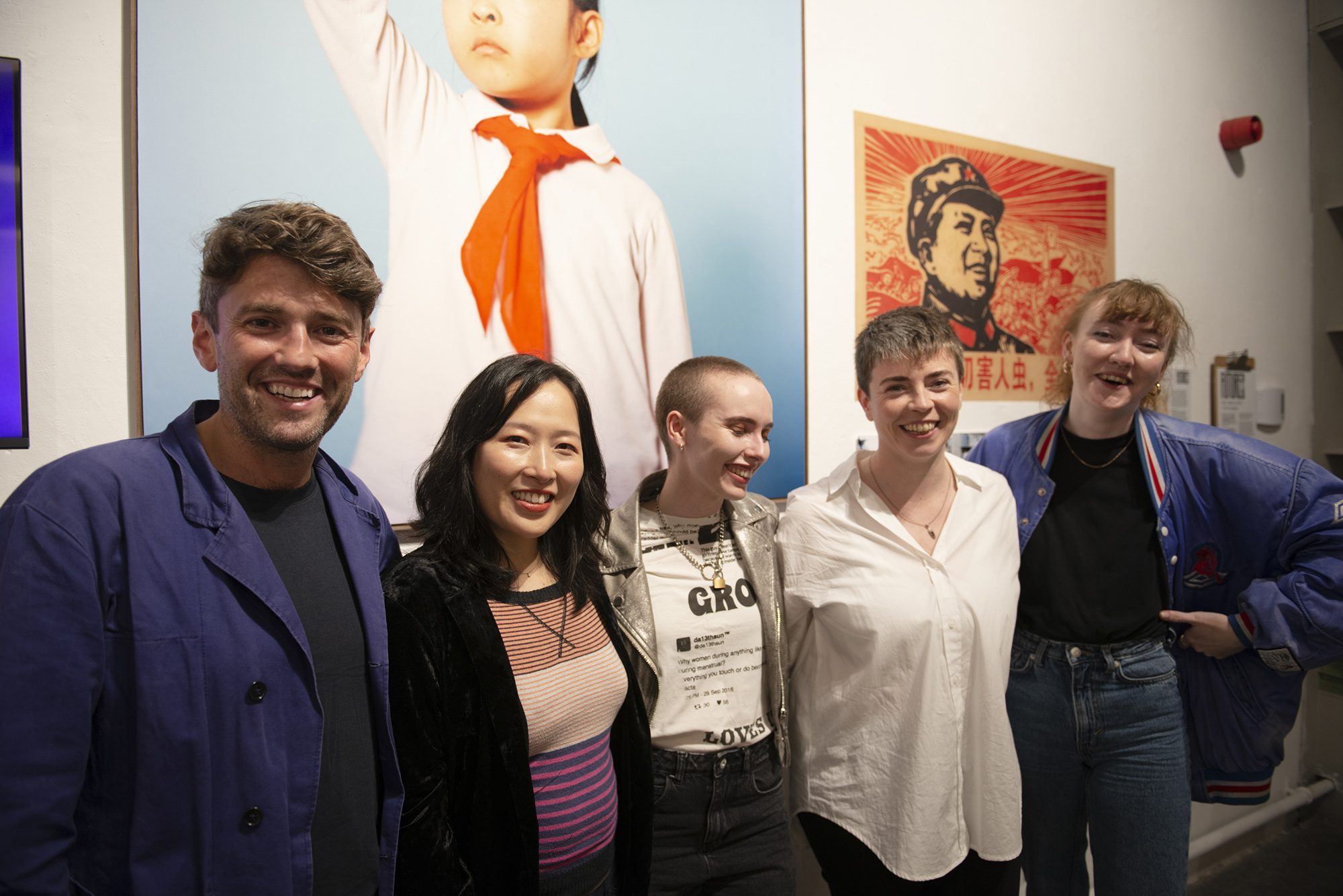
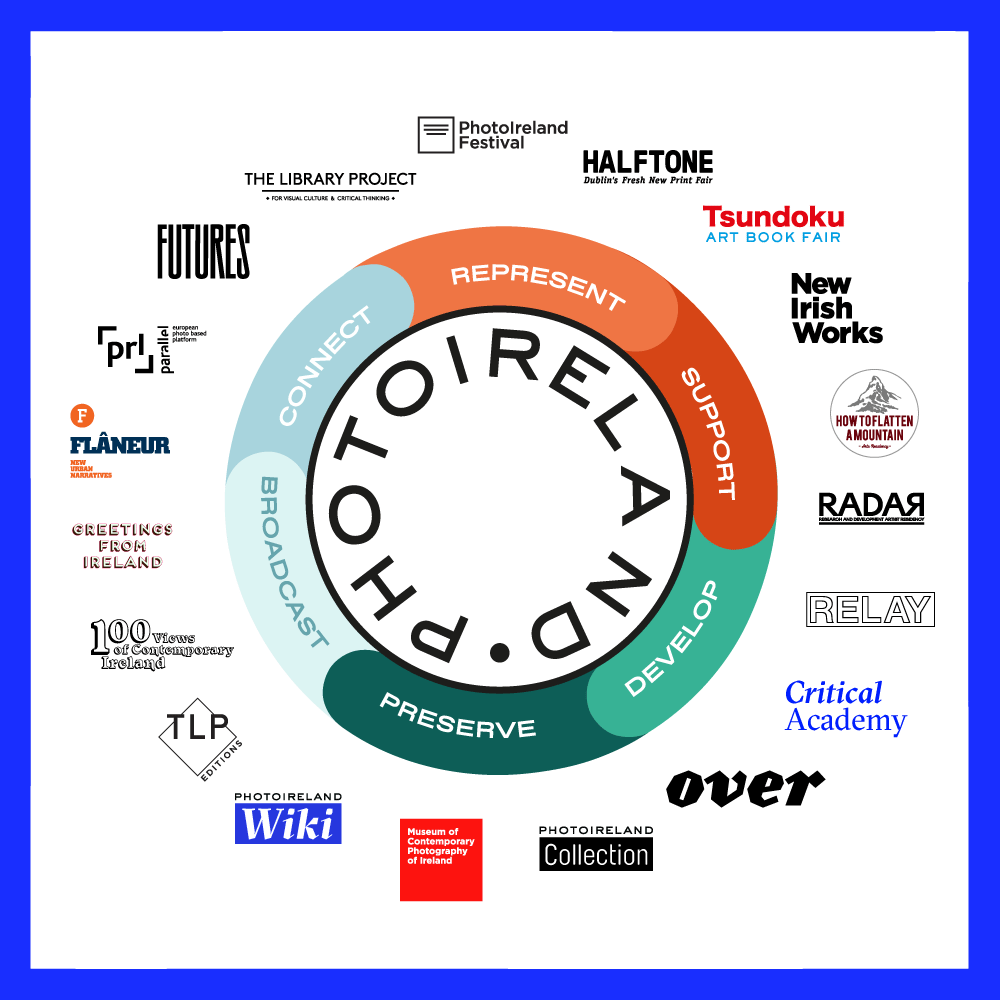
PARTICIPANT ARTISTS
- Antonio Guerra
- Dávid Biró
- Hiền Hoàng
- Marta Pinto Machado
- Tanja Engelberts
- Umberto Diecinove
- Yana Kononova
- Yana Wernicke
Antonio Guerra
Raise the Earth, Disappear
Through a hybrid body of work that moves between photography, sculpture and installation, Raise the Earth, Disappear establishes links between the processes of anthropogenic transformation derived from the mining industry and the processes of image production itself. To achieve this, Antonio Guerra has focused on a series of Spanish mining sites currently undergoing restructuring and restoration.
The artist discusses the impossibility of grasping the complexity of the multifactorial crisis that underlies the ecological emergency and invites us to think about the image from other places, such as the tensions inherent in the concept of landscape or the exploration of new land uses. Some of the territories analyzed by Guerra lead us to an idea of regeneration that also speaks of epistemic reparation, rehabilitation, rereading the past, reflecting on the present and drawing up other de-extractivised scenarios for the future.
In this way, Guerra establishes a kind of landscape that reduces the distance between the discursive and the material plane, as well as between dichotomous categories such as natural/artificial, nature/culture and form/object. At the same time, he opens up the possibility of rethinking the role of the construction of imaginaries in the context of the climate crisis.
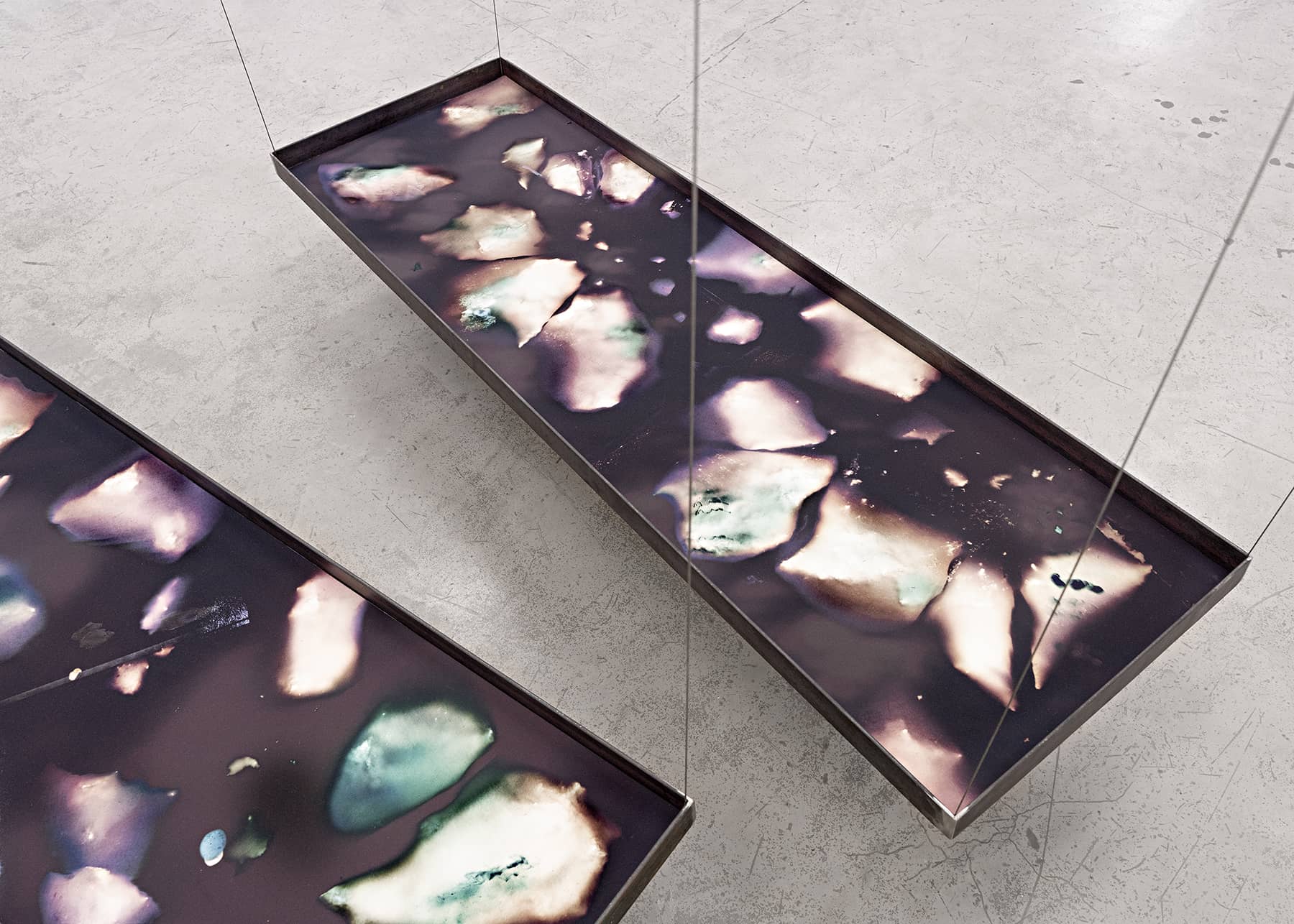
Dávid Biró
Plant
Dávid Biró’s main interest is the influence of the newest technological environment on human behaviour and society. He attempts to detect the blind spots of the technology and to elude the system using various hacks. He takes the ethical issue of observation and being the one who is observed in the discussion, which is unquestionably one of the most important dilemmas of our time. This attitude gains a critical reading of techno-positivist and techno-spiritualist approach, which is dominated by social media, the thirst of information, influential propaganda and AI-driven data-mining. His aim as a visual artist and photographer is to map the blind spots in our contemporary systems and to find the room to bypass the algorithm, be offline and live with the challenges created by our renewable tools.
The Sun is an indispensable primary light source, which enables the visual perception of our reality. Humanity has adapted to its cycle and behaviour with the help of modern technologies. Beyond satisfying the biological demands and the needs of ecosystems, it ensures the operation of technological means, thus these devices are, in fact, transmitters of sunshine. By domesticating it and manufacturing it with its utilisation in mind, the light becomes an instrument, thus we will be capable to use it in various fields and bestow it with new functions. As a result, artificial light offers an alternative for us and is constantly shaping our lives through the extension of the options for its application. Mostly illuminating digital screens make up our almost tactile rapport to light, so that it transmits visual surfaces as a medium and turns from an instrument into a primary information source again.
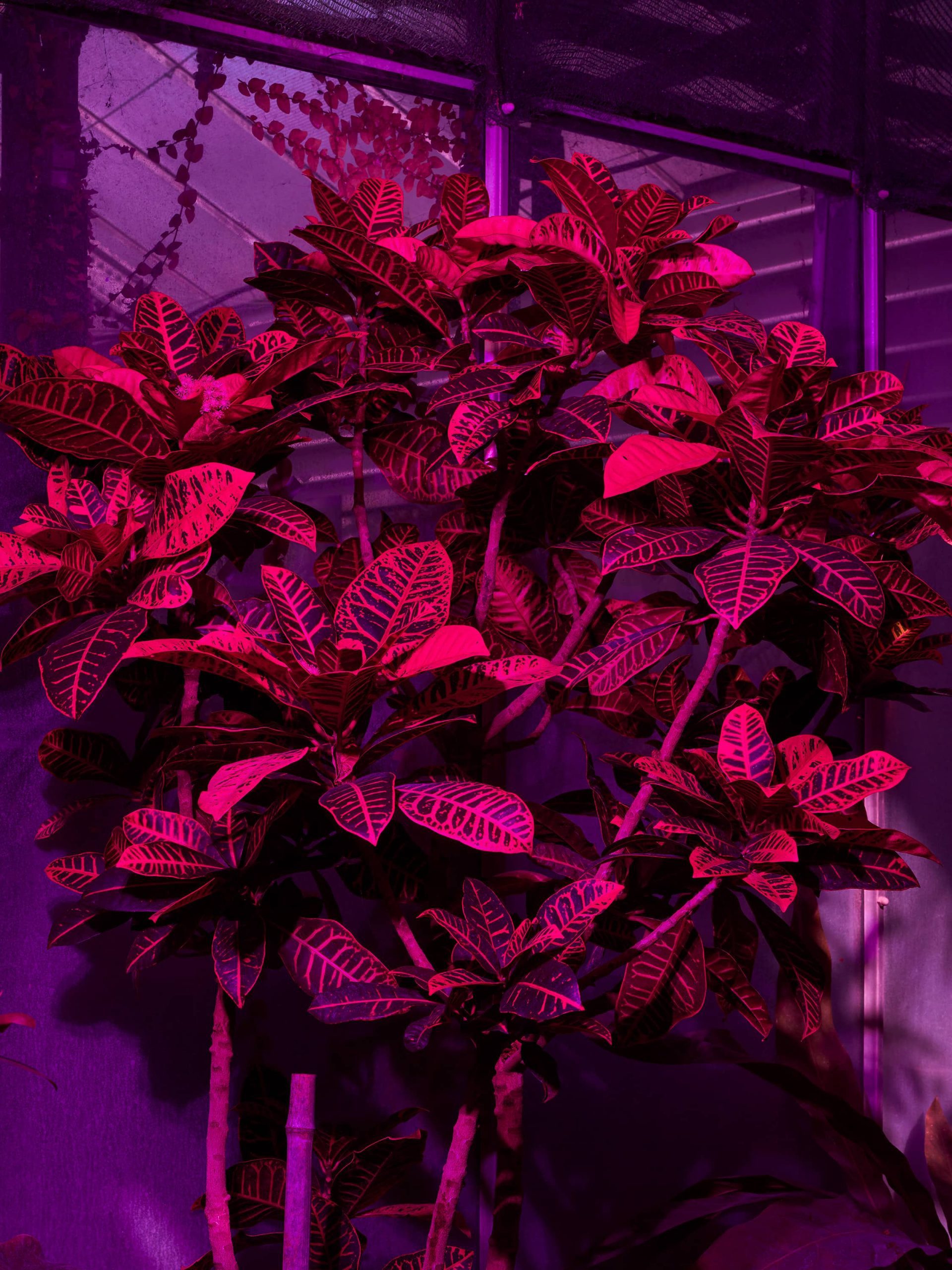
Hiền Hoàng
Scent from Heaven
Hiền Hoàng is an interdisciplinary artist from Vietnam based in Hamburg, Germany. Hoàng’s work explores cultural narratives, human-nature relationships, and identity complexities.Her artistic repertoire includes photography, installation, performance, film, VR and object art. Her artistic journey is characterised by pushing the boundaries of perception through diverse media—from experimental films to immersive installations—engaging viewers in emotive landscapes and introspection.
The project Scent from Heaven (2023 – ongoing) delves into the transformation and value of Agarwood—a revered wood object from Vietnam known for its healing properties. This work reflects on humanity’s interactions with nature and the embodiment of “exotic wood” as both a dream for salvation and nature’s suffering.
The first official report on Agarwood dates from 1534 by Garcia de Orta, a Portuguese biologist who travelled to Southeast Asia. Yet before de Orta‘s discovery, the scented wood is said to have been one of the spices used to apply to Jesus‘ body after his crucifixion. Nowadays, Agarwood is often used in the perfume industry and is still a symbol of wealth and high society. However, it is the very result of the suffering of the Aquilaria tree. The trees have to endure years of pain and are cut down en masse, although only a small percentage of trees can produce agarwood. Due to its high quality and rarity, the harvesting and production of agarwood are heavily influenced by Vietnam‘s history under colonisation.
For this project, Hoàng conducted research and worked in different places and contexts: visual and field recordings in plantations in Vietnam and CT imaging at the Institute of Biomechanics. In doing so, she focused on the process of agarwood‘s formation and interpreted the wood as something alive.
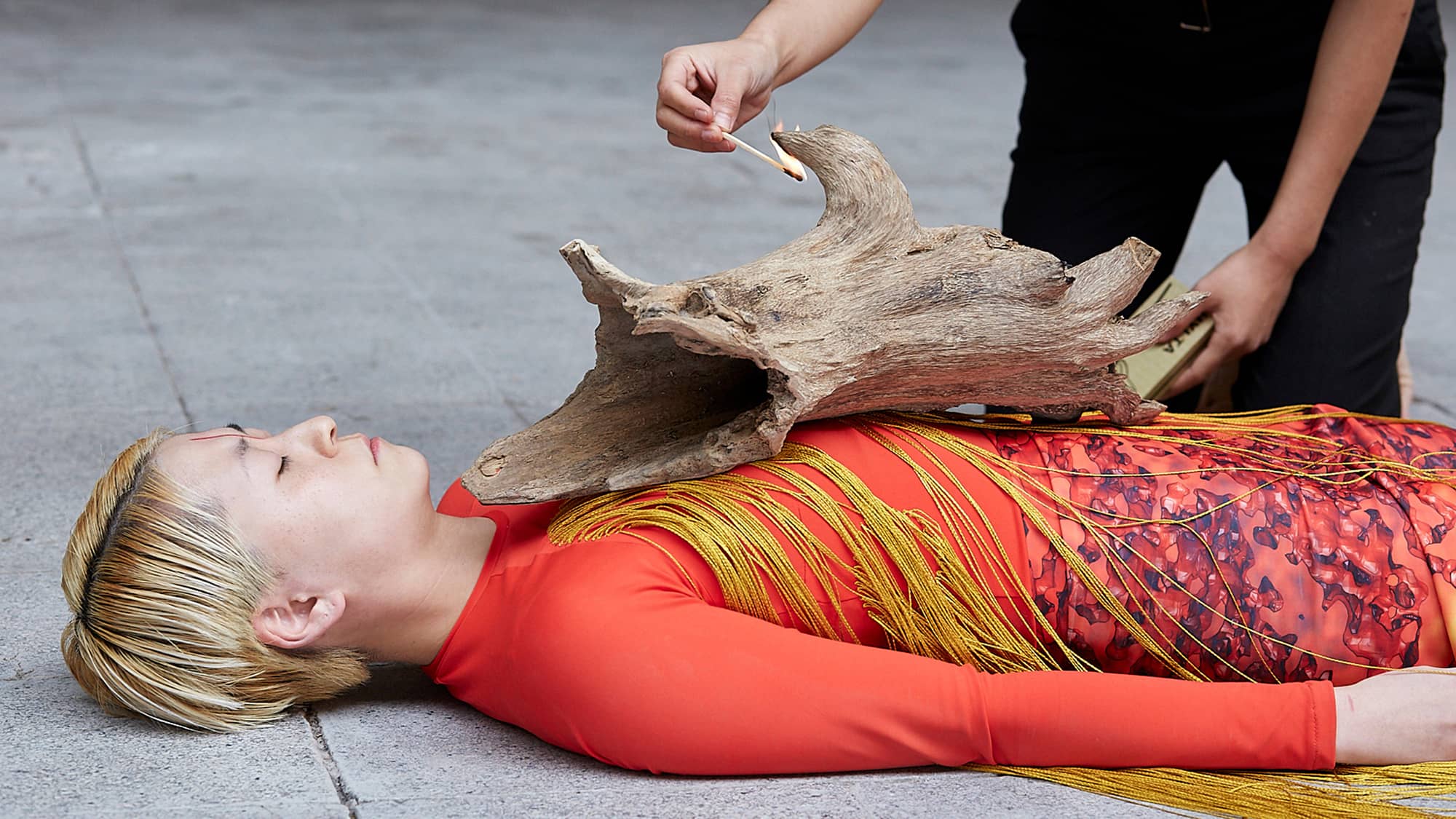
Marta Pinto Machado
Beyond Solid Ground
As an artist, the methodology Marta Pinto Machado uses is one of the architect, meaning she responds to the context by not acting on a subject before understanding it. It means that to have a responsible knowledge before acting, Machado needs to respond to the context in which she is also a part of. Graduated in architecture in 2013 and a Master in Photography in 2021, Machado is interested in themes such as architecture and territory. Besides studying the autobiographical context of a territory, she finds in photography the tool for signification, through the palimpsest of places that are familiar to her. The work developed revolves around a set of circumstances, social, external or organic, moving through different themes and stories that Machado wants to tell around a certain subject, it is not defined by a specific aesthetic or form. Concepts like melancholy, memory, place, identity and colonialism are the main themes around her body of work.
In Beyond Solid Ground, the artist considers how colonial structures shaped contemporary cities and how the energy of presence in these spaces could be a form of resistance. She does this through photographing spaces, buildings, and performers of colour within those spaces.
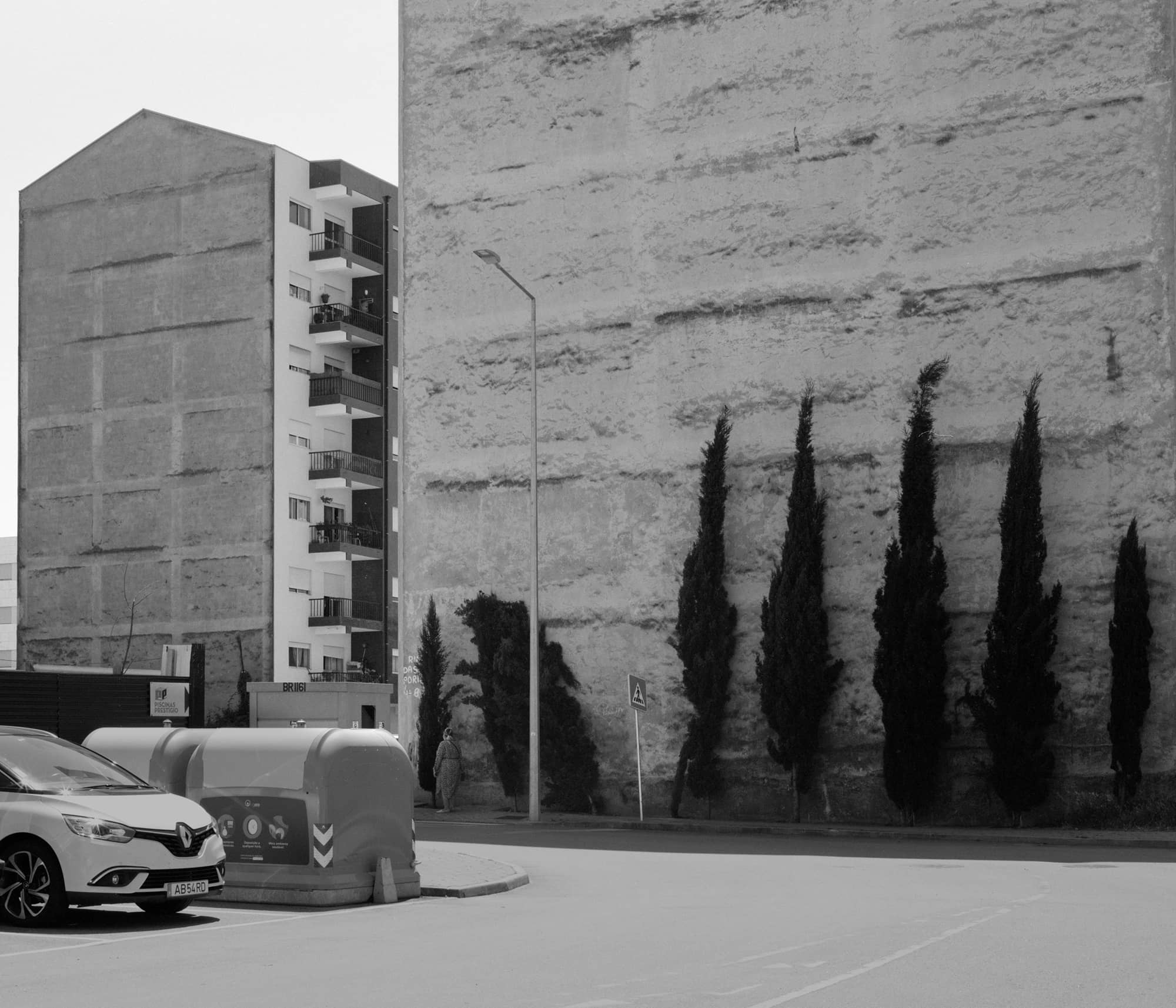
Tanja Engelberts
Forgotten Seas
Tanja Engelberts lives and works in The Hague, The Netherlands. For the past four years she has worked on several projects related to the fossil fuel industry and in particular the changing landscape of the North Sea, disappearing oil and gas platforms. Through these projects, she also explores our changing attitudes towards this industry. In her artistic practice she studies what happens to the processes that set people in motion, which have consequences that manifest themselves long after they have disappeared.
The world offshore is a world unknown. At least for most of us. Fascinated by the flashing lights in the distance, like the call of sirens on the horizon, Tanja Engelberts became interested in the offshore oil and gas industry. Forgotten Seas is the accumulation of six years of research, a journey across the North Sea. Upon the waves we go. From optimism and the feeling that man had conquered nature in the fifties, to a more critical view on the fossil fuel industry and its future: the destruction of the first platforms. Forgotten Seas is a testament of seventy years of gas and oil drilling in the North Sea, an industrial landscape that is slowly disappearing.
The video Decom is a portrait of a decommissioning yard, the place where oil and gas platforms come to die. The huge structures are lifted from the sea and are broken apart, recycled and re-used on land. The film is devoid of any people; the machines have taken over to clean up the scraps of man.
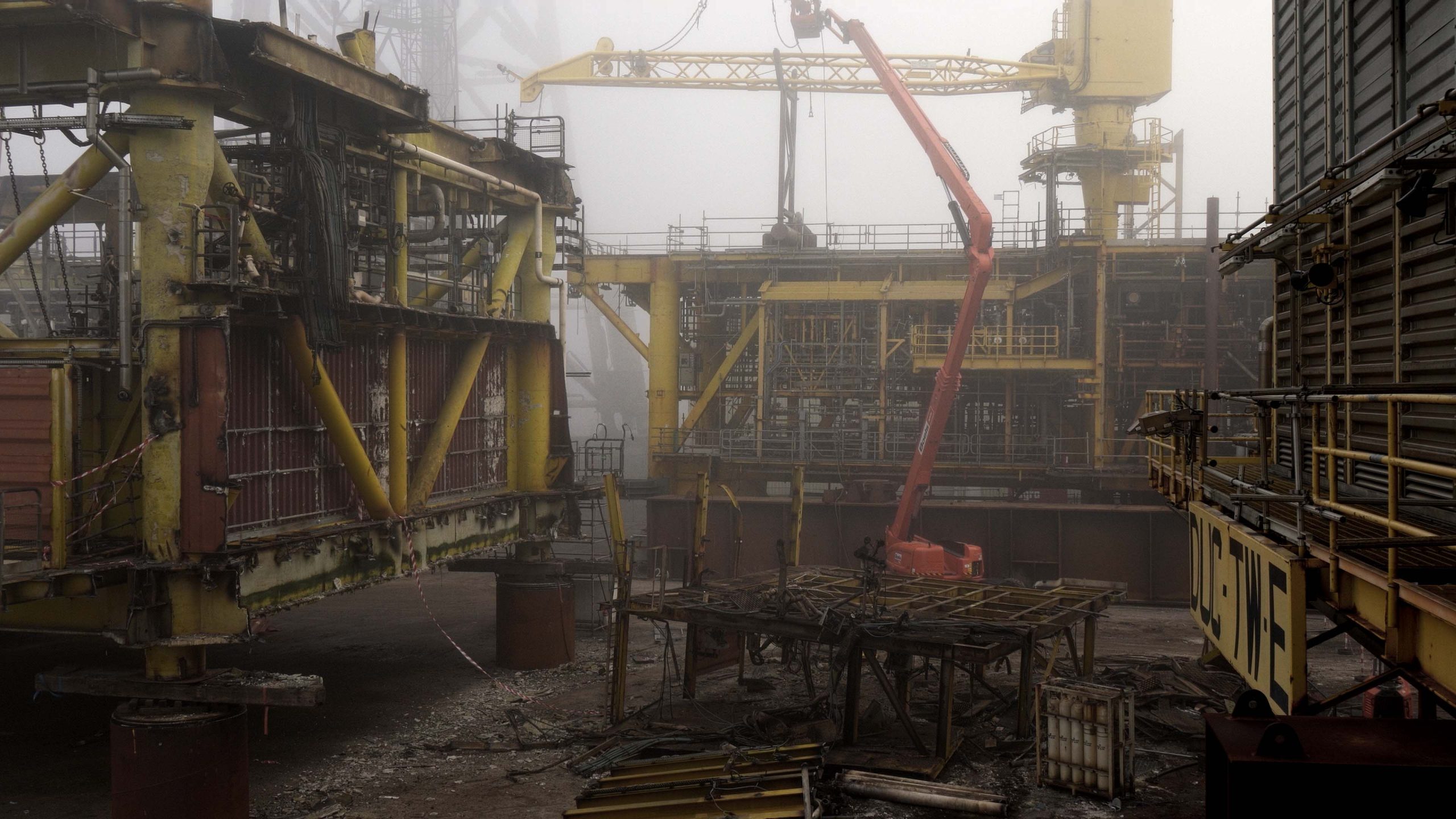
Umberto Diecinove
I N S C T S
Umberto Diecinove is an Italian photographer who currently lives between Turin and Madrid. With an academic background in Literature and Philosophy, he works as a documentary photographer and filmmaker. Diecinove’s multimedia projects – made in collaboration with other artists – include P A R I S N E S S, HAIKU, and Silencio.
Presented at the exhibition is Insects For Peace—the first chapter of Diecinove’s ongoing project I N S C T S that documents the solutions insect farming offers to some global environmental and social challenges. Insect farming is a re-distributive and sustainable agricultural practice with the potential of empowering smallholder farmers all over the world. ‘Insectos Por La Paz’ is the name of a social project created by a young woman: Karol Barragàn Fonseca, professor at the Universidad Nacional De Colombia. Her project promotes the reintegration of former members of the Revolutionary Armed Forces of Colombia – People’s Army and supports the livelihoods of indigenous people and those affected by the conflict training them to become smallholder insect producers.
I N S C T S tells the story of an ongoing (re)connection to nature based systems, the story of a global revolutionary opportunity.
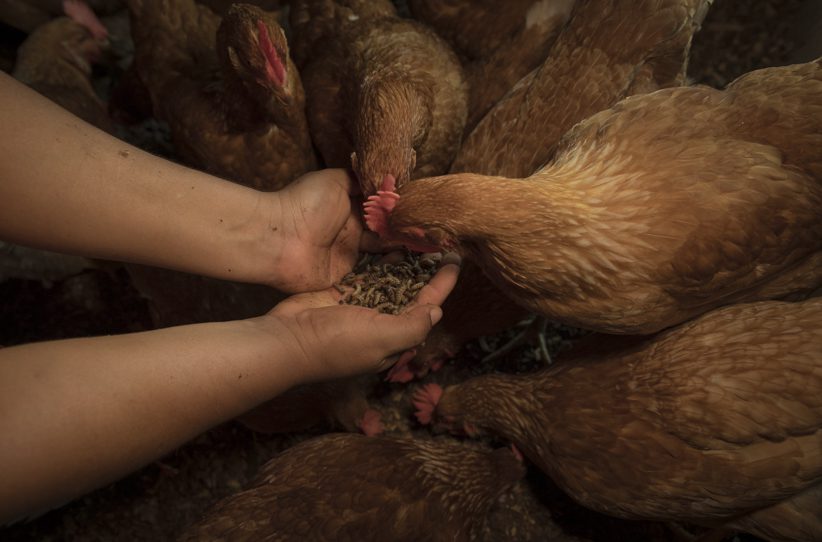
Yana Kononova
Peat Ontologies / X-Scapes
Yana Kononova has an academic background in engineering and social sciences, concluding in a PhD in sociology. She hails from Pirallahi island—the region of the Caspian Sea, culturally shaped by oil and gas extraction. Later, her family migrated to Ukraine due to the First Nagorno-Karabakh War. Kononova’s practice involves ecocritical investigations that position terrains not as mere backdrops or scenery for human history, but as historical processes in their own right. She engages with the development of the idea of landscape as a protagonist, speculatively addressing the sensibility of the landscape itself. Her work also centres on weird ecologies and geographies, exploring the landscape as a milieu of techno-geographical imagination that both possesses and creates historicity.
X-Scapes is a series of landscapes shaped by the thermal impact and shockwave on materials. During one of the artist’s early trips at the onset of the war, she encountered the heaving, haunting remnants of fuel tanks, twisted and mangled by air bombardment. This visual struck her with the incomprehensible extent of damage caused by technical warfare, the brutal violence inflicted upon both the land and bodies, and how these physical remains bear witness to the psychological distress that ensues. This encounter drove Kononova’s focus towards representing trauma through the materiality of war.
Kononova’s work led her to industrial and warehouse locations that had endured extensive destruction due to air attacks. Within these settings, she captured images that seemed to lack direct war signs and historical context. However, this abstraction of the document heightened the tension between a formal approach and the emotional devastation that accompanies the sight of warped and scarred metal. These landscapes, where the boundary between a futuristic utopia and the contemporary dystopia of technical warfare blurs, also prompted contemplation on our relationship with and interpretation of technology.
Alongside, showing Peat Ontologies offers an ecocritical investigation into the representation of peatlands, challenging stereotypes surrounding the historical gendering of bogs. It questions both values, which frame the ‘conquest’ of otherwise ‘unproductive’ wetlands, and the Romantic notions about bogs as ominous and perilous landscapes fraught with trials of masculinity and martial struggles, deeply rooted in collective identity tropes. Instead, this project seeks to reimagine peatlands, focusing on their transformative power—their eerie ability to preserve but also alter substances. Kononova’s expeditions primarily focus on the southern region of the Irdynsky bog, which was the first to bear the brunt of peat mining in Ukraine and has undergone significant changes in the nearly one hundred years since its cessation.
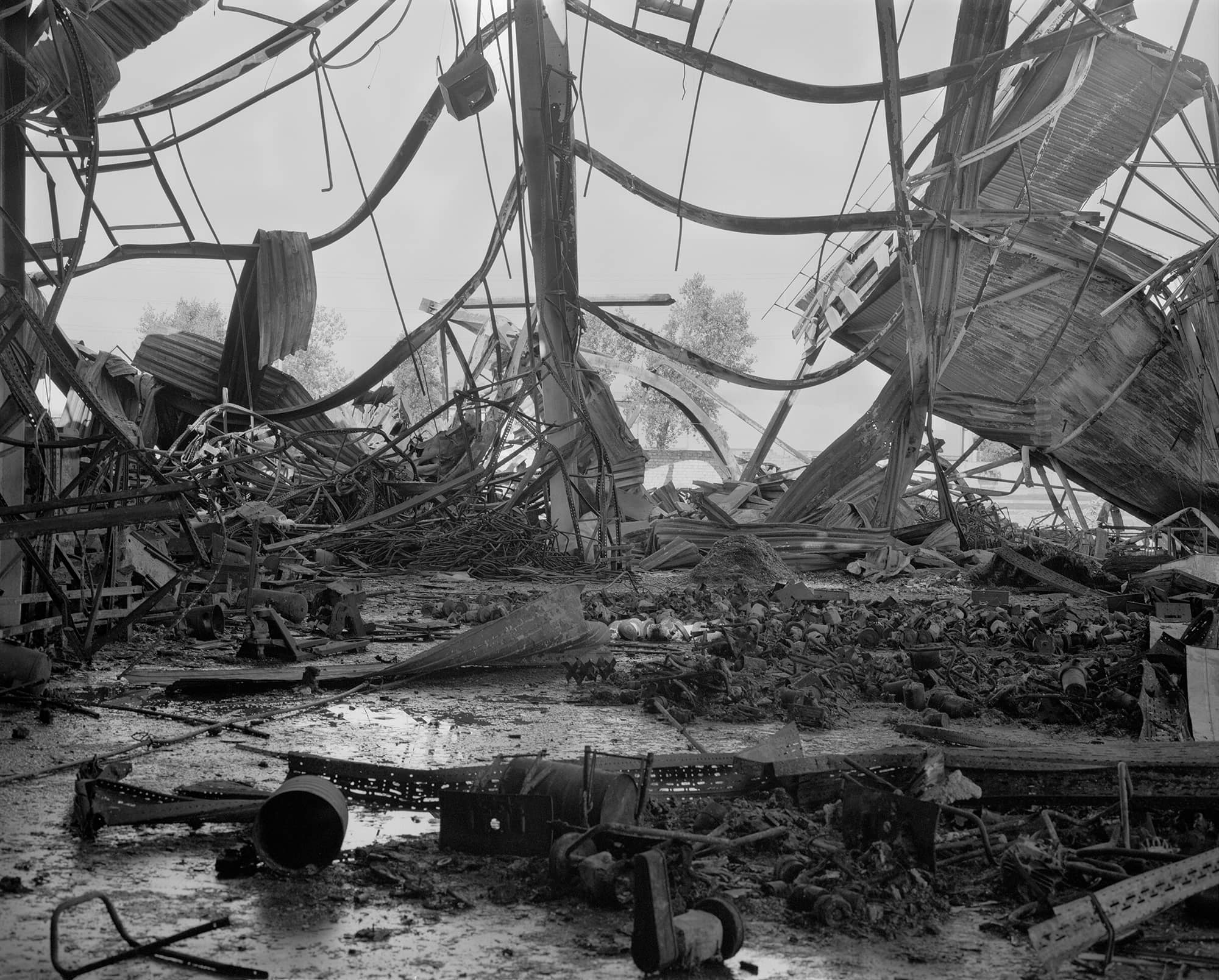
Yana Wernicke
Companions
Yana Wernicke is a German photographer currently based in a small town close to Frankfurt am Main. Her work often revolves around the photographic depiction of animals and humankind’s relationship to nature and other beings.
John Berger’s landmark Why Look at Animals? describes the ‘species loneliness’ of modern man: how the ancient relationships between humans and nature have broken down, reducing the existence of animals to marginalised objects, as commodities, and as Other. Concerned with modern humanity’s yearning for a deeper connection to ecology, Wernicke’s series is a touching portrait of two young women who have established profound relationships with animals. Rosina and Julie each independently save animals from certain death and create bonds of love and trust with animals typically considered solely for their economic value.
In German, Companions, or Weggefährten, is a hybrid word that translates literally as ‘those who walk the path together’. Through tenderness, touch and intuition, Wernicke’s camera follows that path – of joy, emotions, tenderness and play between humans and animals – striving to close the gulf between our emotional consciousness and those of the other animals we live alongside.
FUTURES Photography Platform is co-funded by the Creative Europe programme of the European Union and PhotoIreland’s participation is kindly supported by the Arts Council of Ireland through the Co-Funding Award.
Related News
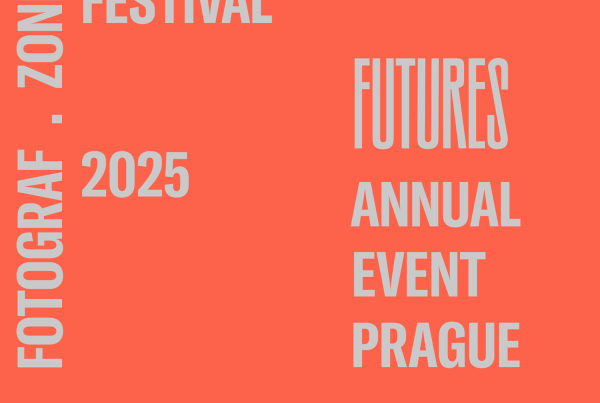
PhotoIreland in Prague 2025 with FUTURES Artists
